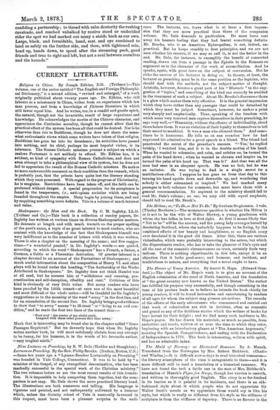Shakespeare: the Man and the Book. By C. M. Ingleby,
LL.D. (Triffiner and Co.)—This book is a collection of sundry papers, Dr. Ingleby has written at various times on diverse Shakespearian matters. He descants at length and with much warmth on the proper spelling of the poet's name, a topic of no great interest to most readers, who are content with the knowledge of the fact that Shakespeare himself was very indifferent as to the number of letters with which it was written. There is also a chapter on the meaning of the name ; and five sugges- tions—" a wonderful pentad," in Dr. Ingleby's words — are quoted, according to which the word " Shakespeare " has a French, a Saxon, a German, a Celtic or a Florentine derivation. Of greater interest is a chapter devoted to an account of the Portraiture of Shakespeare; and much useful information about the composition of Henry VI. and other plays will be found under the heading, "The Authorship of the Works Attributed to Shakespeare." Dr. Ingleby does not think Hamlet was at all mad, but he accuses him of "selfishness and cunning, pro- crastination and self-deception, ribaldry and rant." Criticism of this kind is obviously of very little value. But many readers who have been puzzled by the 146th sonnet—at once one of the most beautiful and most difficult of the whole series—will be thankful for Dr. Ingleby's suggestions as to the meaning of the word "array " in the first line, and for an emendation of the second line. Dr. Ingleby brings good evidence to shew that " to array " means " to ill-treat " or " bring to an evil con- dition," and he reads the first two lines of the sonnet thus :— "Poor soul ! the centre of my sinful earth,
Leagued with these rebel powers that thee array."
Much that is interesting may be found also in the chapter called " Some Passages Reprieved." But we -devoutly hope that when Dr. Ingleby writes another book, he will most sedulously abstain from any attempt to be funny, for his humour, is in the words of his favourite author, 4' very tragical mirth."


































 Previous page
Previous page